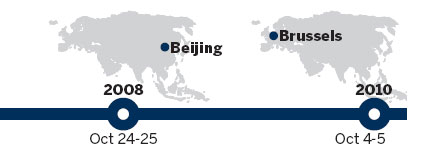China Perspective
Nations hope ASEM Summit will help bind them closer together
By Zhang Haizhou (China Daily)
Updated: 2010-10-04 08:25
 |
Large Medium Small |
 |
 |
 |
LONDON - The 8th Asia-Europe Meeting (ASEM) Summit, to be held in Brussels, Belgium, on Monday and Tuesday, is the first of the biennial gatherings since the Lisbon Treaty came into force in December 2009.
| ||||
"Member states have widely different interests, and the creation of consensus between them is very hard. Sometimes one thinks that the EU will never translate its immense commercial importance into political influence," Kerry Brown, a senior fellow on Asia at the London-based Royal Institute of International Affairs, told China Daily.
The ASEM Summit brings together the 27 EU member states and the European Commission with 16 Asian countries and the ASEAN Secretariat - representing 58 percent of the global population, 50 percent of global GDP and more than 60 percent of global trade - for an informal process of dialogue and cooperation.
On the bilateral level, China and the UK have work to do if they are to improve their relationship and make it mutually beneficial.
China remains a major focus for the UK's economic interests, Brown said, commenting on the coalition government's China policy since taking the power in May. British Chancellor of Exchequer George Osborne and Foreign Secretary William Hague have visited China over the past five months, seeking to boost bilateral trade, which reached $39.1 billion last year.
Trade in the first four months of 2010 was up nearly 30 percent, according to Chinese statistics.
"We should be striving for interdependent and symbiotic relationships to create mutual benefit," said Alex Mackinnon, an international strategy consultant and co-author of China Calling: A Foot in the Global Door and China Counting: How the West Was Lost.
For example, Mackinnon said, China can benefit from the UK's experience in the development of contract law.
"There is also in the UK a fair and reasonable arbitration environment and China could agree that some disputes may be allowed to be arbitrated in the UK under guidance from scholars of both nations," he said.
The UK can also learn from China. Jeremy Browne, the minister of state at the British Foreign and Commonwealth Office, for instance, intended to use his visit to China in mid-September as the opportunity to see "how the UK can learn from the extraordinary success of Beijing Olympics".
China Daily



